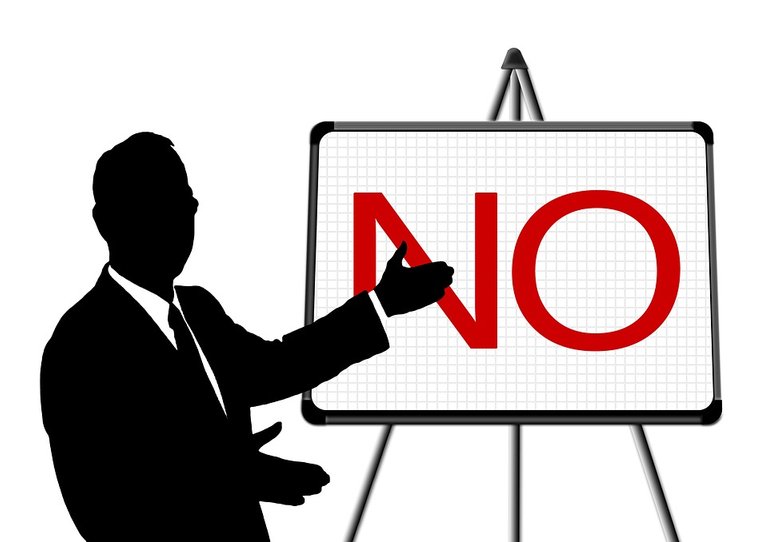How To Say "NO" Without Feeling Guilty
We’ve all been there. You’re asked to do something and before you know it, you’ve said yes. But then you realize that you really don’t have the time or energy to do it. What do you do? Saying no can be tough, but it doesn’t have to be complicated or feel guilty. In this post, I will give you a few tips on how to say no without feeling guilty.
 Source: Max Pixel
Source: Max PixelWhy it's important to know how to say no
Saying no is hard. We're taught that it's impolite, ungrateful or even selfish. But what if you've been taken advantage of one too many times and your well-meaning yes turns into resentment and overwhelm? What if you could use your no in a way that took care of yourself and your relationships? The ability to say no without guilt is an essential life skill. It's not about being unhelpful or rejecting others. It's about knowing your limits and taking care of yourself first and foremost. In this blog, I will talk about why it's important to say no, how to set boundaries, and how to say no with kindness and grace.
The art of saying no
Saying no doesn't have to be difficult. In fact, it can be downright liberating. But if you're like most people, you might find it challenging to say no without feeling guilty. After all, we're socialized to put other people's needs before our own. And we're taught that it's not polite to say no. But what if you don't have the time or energy to do something? Or what if you simply don't want to do it? That's where the art of saying no comes in. The following tips may help you say no without feeling guilty or uncomfortable.
 Source: Max Pixel
Source: Max PixelThe psychology behind why we feel guilty when saying "No"
Saying no is hard. We know that. And sometimes, it feels like we're the only ones who ever say no. But why do we feel so guilty when we do? It all comes down to the psychology behind it. When we say yes to something, we're often seen as being helpful, supportive and accommodating. We're praised for being good people and seen as someone who goes out of their way to help others. On the other hand, when we say no, we're often viewed as unhelpful, selfish and uncooperative. We become the bad guy and are seen as someone who's not interested in helping others. This is often referred to as the 'Costly Signal Theory'. Essentially, it means that when we say yes, we're seen as signaling that we're good people and when we say no, we're signaling that we're not. And that feels pretty bad.
How to say "No" without feeling guilty
It can be tough to say no, especially when you don't want to let somebody down. But there are ways to do it that won't make you feel guilty. First, try to figure out what the person is asking of you. Is it something that's reasonable and within your capabilities? If it is, then tell them straight up that you can't do it. If it's something that's outside of what you're capable of, or if it's just not something you're interested in, then try explaining your reasoning in a polite way. It's important to be honest and respectful, even if the answer is no. And don't forget - you're not obligated to do anything you don't want to!
Remember that it's okay to say no, and you don't have to feel guilty about it. Just be honest and communicate your needs clearly, and you'll be able to decline requests without any drama. I know it can be tough, but it's definitely worth it in the end.
Thanks for reading!
TR
Hepimizin başına gelmiştir. Sizden bir şey yapmanız isteniyor ve siz bunu bilmeden önce evet dediniz. Ama sonra bunu yapmak için gerçekten zamanınız veya enerjiniz olmadığını fark ediyorsunuz. Ne yaparsınız? Hayır demek zor olabilir, ancak karmaşık olması veya suçluluk duyması gerekmez. Bu yazıda, suçluluk duymadan nasıl hayır diyeceğinize dair birkaç ipucu vereceğim.
Hayır demeyi bilmek neden önemlidir?
Hayır demek zordur. Bize bunun kaba, nankör ve hatta bencilce olduğu öğretildi. Ama ya birinden çok fazla yararlandıysanız ve iyi niyetli evetiniz küskünlüğe ve bunalıma dönüşürse? Ya hayırınızı kendinize ve ilişkilerinizi gözeten bir şekilde kullanabilseydiniz? Suçluluk duymadan hayır diyebilme yeteneği, temel bir yaşam becerisidir. Bu, yararsız olmakla veya başkalarını reddetmekle ilgili değil. Sınırlarınızı bilmek ve her şeyden önce kendinize bakmakla ilgilidir. Bu blogda hayır demenin neden önemli olduğundan, sınırların nasıl belirleneceğinden ve hayır demenin nezaket ve incelikle nasıl yapılacağından bahsedeceğim.
Hayır deme sanatı
Hayır demek zor olmak zorunda değil. Aslında, tamamen özgürleştirici olabilir. Ancak çoğu insan gibiyseniz, suçluluk duymadan hayır demeyi zor bulabilirsiniz. Ne de olsa, diğer insanların ihtiyaçlarını kendi ihtiyaçlarımızın önüne koyacak şekilde sosyalleştik. Ve bize hayır demenin kibarca olmadığı öğretildi. Ama ya bir şey yapmak için zamanınız veya enerjiniz yoksa? Yada sadece yapmak istemezseniz? İşte burada hayır deme sanatı devreye giriyor. Aşağıdaki ipuçları, suçluluk veya rahatsızlık hissetmeden hayır demenize yardımcı olabilir.
Hayır derken kendimizi suçlu hissetmemizin arkasındaki psikoloji
Bazen, hayır diyen sadece bizmişiz gibi geliyor. Ama yaptığımızda neden bu kadar suçlu hissediyoruz? Her şey arkasındaki psikolojiye bağlı. Bir şeye evet dediğimizde, genellikle yardımsever, destekleyici ve uzlaşmacı olarak görülürüz. İyi insanlar olduğumuz için övülüyoruz ve başkalarına yardım etmek için kendi yolunun dışına çıkan biri olarak görülüyoruz. Öte yandan, hayır dediğimizde genellikle yararsız, bencil ve işbirliği yapmayan kişiler olarak görülürüz. Kötü adam oluyoruz ve başkalarına yardım etmekle ilgilenmeyen biri olarak görülüyoruz. Bu genellikle 'maliyetli sinyal teorisi' olarak adlandırılır. Esasen bu, evet dediğimizde iyi insanlar olduğumuzun işareti olarak görüldüğümüz ve hayır dediğimizde olmadığımızın sinyalini verdiğimiz anlamına gelir. Ve bu oldukça kötü hissettiriyor.
Suçluluk duymadan nasıl hayır denir
Özellikle birini hayal kırıklığına uğratmak istemiyorsanız, hayır demek zor olabilir. Ama bunu yapmanın seni suçlu hissettirmeyecek yolları var. Önce karşınızdakinin sizden ne istediğini anlamaya çalışın. Makul ve yetenekleriniz dahilinde olan bir şey mi? Eğer öyleyse, onlara doğrudan yapamayacağınızı söyleyin. Yapabileceklerinizin dışında bir şeyse veya ilgilendiğiniz bir şey değilse, o zaman gerekçenizi kibar bir şekilde açıklamayı deneyin. Cevap hayır olsa bile dürüst ve saygılı olmak önemlidir. Ve unutma - istemediğin hiçbir şeyi yapmak zorunda değilsin!
Hayır demenin normal olduğunu ve bunun için suçluluk duymanıza gerek olmadığını unutmayın. Sadece dürüst olun ve mesajınızı net bir şekilde iletin; istekleri drama olmadan geri çevirebileceksiniz. Zor olabileceğini biliyorum, ama sonunda buna kesinlikle değer.
Okuyan varsa teşekkürler.
This is one of the most helpful blogs I've seen today. The art of saying no isn't well practiced especially in this world where the desperation for validation from people who don't even care wreaks havoc.
And it's true that only people who say yes are seen as good. An the funny thing is, when we're saying yes all our lives and say no once, all our yesses are erased and replaced with a bad image.
Thanks so much for sharing...
I totally agree with what you wrote. It's important to say no sometimes.
Thanks for stopping by.
This is very useful and precise. Saying no growing up was difficult for me because I feel that I would be appreciated for the help I offer to my loved ones.
We have all been there actually.